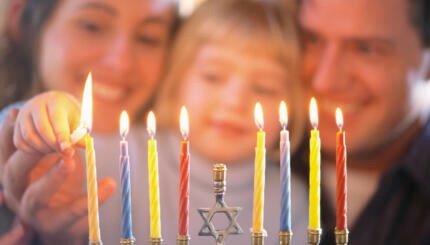I’m getting married next week. Most of the wedding planning is done (but, oy, the table assignments, they continue to plague me!) and now the fun conversations are not about planning a one-day event, but rather planning the rest of our lives together.
One of the things that my fiancé and I have discussed quite a bit recently is what rituals might change in our lives once we are married. This is not only about the joining together of two people with two different sets of backgrounds, experiences, and traditions, but it’s also about thinking about what marriage represents in our evolving individual and collective identities.
As a single woman (and rabbi), I’ve spent a lot of time over the years thinking about how Judaism (and Jewish institutions) tend to be so family based. That’s part of the beauty of Judaism and yet it’s also the thing that sometimes makes it harder for single adults to connect with. Some well-meaning rabbis ask congregants to put their arms around family members at services – something that feels great if you are there with family and something that feels lonely if you are there as a single person. There are “family Shabbats” – which are an amazing way to include children and adults of all ages in services, but the challenge for those creating those experiences is how to make adults without children feel part of the experience as well. Certainly it can be done successfully and often is – so that everyone feels included – but there needs to always be intentionality about thinking about the diverse demographics of any community.
And then there are the home rituals. It feels very different, to me, to light Shabbat or Hanukkah candles at home by oneself, than it does among friends and family. I don’t light Shabbat candles every week, and I have never lit them when I’ve been home alone on a Friday night. When I’m home alone during Hanukkah, I don’t always even light the menorah each night.
Now that I’m going to be married (did I mention the wedding is next week!?!?), rituals will become more central in our lives. It’s not just because I now have a live-in Shabbat buddy or Hanukkah buddy, but it’s more about marking the beginning of our family life together. We’ve spoken about wanting to build in Friday nights as a time to pause from the week, to shift our thoughts from our daily routine and to focus on what is most important to us.
Lighting more candles, eating more challah, and maybe even attending synagogue more often will not make me any more Jewish. I like to think I’m pretty Jewish to begin with! But it does mean that my Jewish practice is evolving. For me, there’s no ideal way to be Jewish – other than to say that ideally, Judaism is something that each of us authentically feels and makes our own. Judaism evolves with us and we evolve with Judaism as we move through various life stages. This should be empowering for individuals as we think about our journeys. And it should be a wake-up call for the organized Jewish community to recognize not only that every community is diverse but also that in each individual’s own lifetime, identity shifts for various reasons at various life stages.
Hanukkah
Pronounced: KHAH-nuh-kah, also ha-new-KAH, an eight-day festival commemorating the Maccabees' victory over the Greeks and subsequent rededication of the temple. Falls in the Hebrew month of Kislev, which usually corresponds with December.
Shabbat
Pronounced: shuh-BAHT or shah-BAHT, Origin: Hebrew, the Sabbath, from sundown Friday to sundown Saturday.



